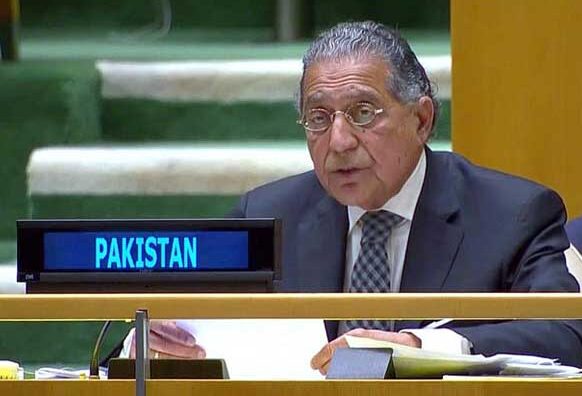NEW YORK: Pakistan has called on the United Nations to actively seek to resolve festering disputes, such as Kashmir and Palestine, with several modalities for conflict resolution being available under the UN Charter.
“The current threats to peace and security emanate mainly from violations of the fundamental principles of the UN Charter, especially non-use of force, foreign occupation, demand of self-determination, great power rivalries, and a new arms race,” Ambassador Munir Akram said after UN Secretary-General Antonio Guterres unveiled his priorities for 2024 as the world faces critical challenges.
The UN chief’s multifaceted report notes that a volatile global security environment is further exacerbated by growing poverty, climate change, injustice, inequality, hate, intolerance, xenophobia and Islamophobia.
“We must prevent a major conflict, especially in a ‘nuclearized environment’,” the Pakistani envoy stressed, pointing out that it is essential to address the root causes of terrorism and new and emerging forms, as also “state terrorism” and “state-sponsored” terrorism; and ensure the protection of human rights while combating terrorism. Ambassador Akram also called for a Security Council that is more representative, more democratic, more transparent, more effective, and more accountable. “This goal can only be attained through a comprehensive reform that caters to the interests of all Member States – small, medium, and large.” he said. The model the Uniting For the Italy/Pakistan-led Consensus (UfC) group, which seeks more elected seats but no additional permanent members in an enlarged Council, was the most likely to secure the “widest possible” support, the Pakistani envoy said. The Inter-Governmental Negotiations (IGN) process offers the best platform to reach an agreed and negotiated outcome to restructure the Security Council, he said. Quoting the Secretary-General that the Sustainable Development Goals (SDGs) are “on life-support”, he noted that over 100 developing countries confront food, fuel and financial insecurity, and over 60 developing countries are trapped by unsustainable debt. In that light, Ambassador Akram said that there was a need for a binding international convention on the right to development. –Agencies



